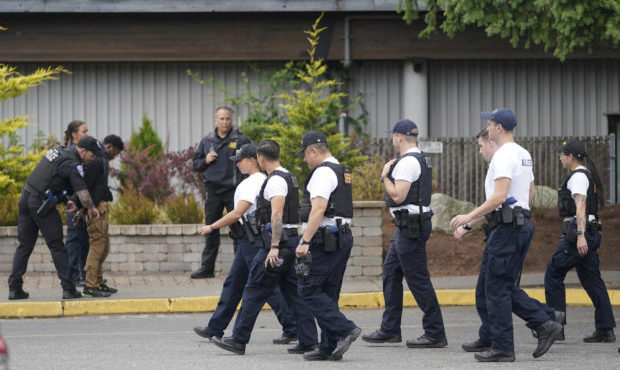Lawmaker, author of state policing bills admits ‘we have a couple of fixes to do’
Aug 5, 2021, 5:56 PM | Updated: Aug 6, 2021, 10:08 am

Cadets at the Washington state Criminal Justice Training Commission, walk past a training exercise in progress in July 2021 in Burien. Washington state is embarking on a massive experiment in police reform and accountability with nearly a dozen new laws that took effect Sunday, July 25. (AP Photo/Ted S. Warren)
(AP Photo/Ted S. Warren)
Law enforcement officers from all around the state have weighed in on new legislation that aims to improve police accountability, which went into effect a week ago Sunday.
Two of the most contentious bills have been HB 1310, which creates a standard for when officers can use force, and HB 1054, which limits police tactics, including pursuits and the use of military weapons.
Law enforcement calls for Attorney General’s opinion on new police laws
KIRO Radio’s Dori Monson says he’s heard from officers that the bills are hampering their ability to do their job. One of the authors of the bills, Rep. Jesse Johnson, explains his perspective.
“I believe it’s important to know that all stakeholders, including law enforcement, operated in good faith when we were negotiating these policies for about eight or nine months,” Johnson said. “Law enforcement was brought into the conversation in December, prior to the legislative session. And we worked hard on these policies, we were up late into the night on Zoom, of course, virtually. We did get the state’s largest police union, the Fraternal Order of Police, to back the bills. Of course, some law enforcement disagrees and we didn’t necessarily come to consensus, but we had collaboration.”
“I believe, at the end of the day, we’re going to have an effective policy that makes our state safer, and less interactions of violence,” Johnson said.
Puyallup
Dori then provided Johnson with examples of recent incidents in Washington where officers have said they were unable to properly respond due to the new bills, starting with a case in Puyallup.
Last week, a young man was murdered on the south hill of Puyallup in a Kohl’s parking lot, as Dori explained. Nobody saw the actual shooting. Pierce County Sheriff’s deputies responded quickly with a K-9 unit. There are a lot of people who saw a guy with black pants and a black shirt running away from the scene, but nobody saw him pull the trigger, Dori said.
The officers had to make the decision, because of the new bill, that they did not have probable cause. If they were to use the police dog to track the suspect, Dori says he was told that would be considered a use of force and was not allowed in this situation.
“When I hear that the use of force policy … actually does limit the ability of police to do their jobs, I’m kind of dismayed at that because it does not prevent investigation,” he said. “So they could corner someone. They can use tactical questioning. What it does is say probable cause has to be developed.”
“And when I hear that, that’s concerning. Because when you look at law enforcement policy, probable cause is when they deemed that a crime has most likely been committed,” he continued. “In my mind, when I saw that, and I’ve talked to numerous law enforcement across the state, probable cause was established the moment that they investigated once they arrived and they had a suspect that looked like the suspect, matched the description. That’s the definition of most likely.”
Dori says since no one saw the suspect pull the trigger, he couldn’t actually be identified as the suspect, and could have been a friend or even a random jogger. The bill, however, says police need probable cause before they can forcefully detain somebody.
“Probable cause is the threshold for any arrest,” Johnson said. “So when we say briefly detained someone, law enforcement says ‘briefly,’ that means 10 or so minutes. And so when I hear that, are the police admitting that the only strategy and investigation is physically threaten or harm citizens? That’s concerning to me also.”
“I think you should be able to use your tactical questioning and call for backup and still pursue or chase the individual,” he added.
Johnson says the bill does not prevent police from questioning someone, just to use physical force, which he says will be more clearly defined by the state Attorney General soon.
“They could investigate and chase and corner someone, so they could still investigate that crime,” Johnson said. “And when I hear the threshold of probable cause, again, that’s most likely that a crime has been committed. That’s the law enforcement definition and statute. So, in my mind, a number of officers, including the Fraternal Order of Police, said probable cause was established in that situation.”
Kennewick
In another example, Dori described a scene in Kennewick where woman had two kitchen knives, one in each hand. Dori says if police had been able to use less lethal bean bags, they could have taken the woman down and would have been able to get the knives and stop her from going into any other businesses.
But because of the new legislation, Dori points out that police have been told to use less lethal tools, like beanbags, but then the other bill banned the guns that can fire bean bags.
“I’ve got to admit for this one, this is something that myself, a number of folks in Legislature, we all missed, including law enforcement,” Johnson replied. “There wasn’t an amendment to amend this part of the bill around military style weapons. So we say in 1310 we want bean ban rounds to be used; 1054 we banned the military style weapons at .50 caliber or above.”
That doesn’t, however, include all bean bag rounds, Johnson clarified, since they’re not all .50 or above. But, in this case, Kennewick’s were .50 caliber and they weren’t allowed to use it, according to the law.
“And this woman could have killed somebody because of this legislation,” Dori said.
“I agree,” Johnson said. “And since then, the Criminal Justice Training Commission came out and said there will not be any sanctions on departments for using the .50 or above because we understand the need to fix it. The AG is going to be weighing on this in the next couple of days. So I agree. That needs to be fixed. … Our intention is that they use the less lethal, including beanbags. So I’m glad you brought that one up. I want the department to know that they will not be sanctioned for using those weapons.”
Johnson disagrees with Dori, though, that this is evidence the bills are sloppy.
“When we started this process after last summer, this is about excessive force, this is about less lethal enforcement of the law,” he said. “And I believe we have to be honest about the fact that there’s bias in law enforcement, just like any other American institution. Our state is no different. But we have to be able to root out bias and violence in law enforcement, in order to have effective public safety.”
“In fact, we can’t have the former until we have the latter addressed,” he added. “And so I think that this legislation, obviously a major piece of legislation, just like Keep Washington Working a couple years ago, there’s going to be flaws. And just when it passes doesn’t mean that’s the end. We’re going to have to fix the ammunition piece, for example.”
Johnson says they’re still negotiating with police right now, and adds that the majority of officers, deputies, and chiefs are committed to doing right by the people they serve. He also noted that a lot of what’s in these new bills was in voter-approved I-940, and now is just being standardized.
“I think we have to be clear that officers have the ability to pursue and to investigate without using physical harm,” Johnson said. “I just don’t like the notion that there has to be physical harm in order to do an investigation.”
Chelan
The final example Dori gave was in Chelan County two weekends ago when a man got out of Western State Hospital, was seen wearing a yellow dress, walking along the highway in Leavenworth, and then stole the school bus that a rafting company uses. He led police on a slow speed chase, but had not committed a violent crime, so Dori says they were not able to use a PIT maneuver or spike strips.
Chelan County sheriffs had to call off their pursuit. The man then went into Douglas County, and they had to call off their pursuit. He ended up crashing the bus, hitchhiking across the street, stealing a front loader and ramming it through the wall of his house.
Dori asked Rep. Johnson: Does all of this not give you pause that maybe this is not just a tweakable bill, but a fatally flawed bill?
“Someone’s stealing a bus and driving all over the place. We say explicitly in the bill, DUI is still at the threshold of reasonable suspicion,” Johnson said about the case in Chelan.
“A number of officers said they would have used reasonable suspicion for DUI when you see someone in a dress stealing a bus and driving all over the place,” he added. “So I think that that’s a fatal flaw on Chelan County.”
Dori points out that police in Chelan did not know the man had just left a psychiatric hospital, and he was not drunk. But Johnson says there’s still an argument for reasonable suspicion of DUI. The concern, Dori says, is if police had stopped the man for a DUI and it was later revealed he had not been drinking, the officers now worry they’d be sanctioned.
“They still had reasonable suspicion. No, they won’t get sanctioned on that,” Johnson said.
“The director of the of the CJTC, Monica Alexander, came out and said that was the DUI reasonable suspicion and they would not have been sanctioned,” he added about that case.
Johnson also said that reasonable suspicion of DUI can include a lot of things.
“Reasonable suspicion means that they believed, again, in often good faith that there could have been a DUI. Just like if someone does the wrong way turn signal and turns wrong and they suspect it’s a DUI,” he said.
But, “cops can’t live their life by the intent of the bill,” Dori replied.
‘Legitimate issues that need to be addressed’ in new state policing laws
To close, Johnson pointed out that they’ve increased funding this year for police by almost $5 million, for de-escalation, and for the co-responder model.
“In fact, all the departments in my district got part of that funding,” he said. “We’re increasing funding for police, we’re trying to increase training. These laws, OK, yes, we have a couple of fixes to do, but accountability for everyone, including criminals, still has to be at the forefront.”
Listen to the Dori Monson Show weekday afternoons from noon – 3 p.m. on KIRO Radio, 97.3 FM. Subscribe to the podcast here.













